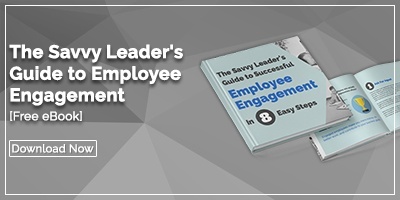 Right now, every business leader in America is doing something they’ve never done before—managing employees through a pandemic. COVID-19 has changed so much about how we live and work that you should not be hard on yourself if you are struggling to support your organization’s culture and to keep your employees engaged.
Right now, every business leader in America is doing something they’ve never done before—managing employees through a pandemic. COVID-19 has changed so much about how we live and work that you should not be hard on yourself if you are struggling to support your organization’s culture and to keep your employees engaged.
Employee engagement is essential for success, especially in this disrupted environment. Organizations with high employee engagement are 21% more profitable. They experience less turnover and absenteeism, and each worker is more productive. But how can you support engagement when remote work and physical distancing are required whenever possible?
Here are a few things to consider:
Attend to Basic Needs
Engagement at work requires energy and psychological wellbeing. It’s hard to muster either when one is under extreme stress or when basic needs aren’t met. If you want engaged employees, start by finding out if there is anything the organization can do to ease the pandemic burden. You might consider rearranging schedules to help parents juggle child care, or perhaps an extra vacation day would help.
If employees are suddenly working remotely, make sure that they have the tools, technology, and equipment to do their best work. Some employees might benefit from assistance with faster internet service or ergonomic office equipment. Removing as many barriers to productivity as possible is an excellent place to start.
Rethink What Engagement Means
Many people confuse employee engagement with employee happiness, but they are not the same. An employee may be satisfied with their job but lack the motivation to engage emotionally. Engagement requires a sense of ownership gained when people are encouraged to think autonomously and when their ideas are valued. This is the perfect time to start a continuous improvement program that leverages software to collect, implement, and measure the value of employee-generated opportunities for improvement.
Use Standard Work
Standard Work is the documented best practice for operating any process or preforming any task. It forms the foundation for all improvement. During a time of disruption, it is easy for people to apply off-the-cuff workarounds to address challenges, but that’s not the best way to guarantee a consistent quality outcome. Instead, agree on the best practice, work to that standard, and only make changes after careful consideration.
Continue or Start Virtual Gemba Walks
Gemba Walks are a Lean management practice where supervisors go to the place where work is done to show respect and observe. After the Gemba walk, opportunities for improvement may be considered. They are a great way to show employees that you are interested in seeing the situation from their perspective. If remote work is in play, consider doing virtual Gemba Walks.
Use Video Conferencing
If you have people spread out because of in-office social distancing or remote work, video conferencing is an excellent tool for maintaining connection. Rather than a bunch of disembodied voices on the phone, your team can see each other, read body language, and know that everyone is paying attention. With frequent check-ins via video, you won’t feel so much like strangers.
Don’t Neglect Recognition
You’ve got a lot on your plate, but this is not the time to neglect to recognize people who are doing great work. Not only does recognition encourage the employee you call out to be more engaged, but others appreciate the acknowledgment as well. The best improvement management platforms have broadcasting capabilities, so it is easy to make sure that everyone knows who contributes to positive change.
Empower Subject Matter Champions
Make a list of all the new challenges your organization faces because of the pandemic. Perhaps it includes issues related to remote work. Maybe you are facing hiring challenges or difficulties getting necessary supplies. We think it is a great idea to assign those challenges to employees who will become the subject matter champion. They don’t need to solve the problem themselves, but they should learn everything they can about it and bring it to the table where solutions can be discussed. It’s a great way to let individuals take ownership and initiative. Once they’ve been successful, they’ll want to take on even more.
It’s essential to be empathetic and patient right now, but that doesn’t mean losing sight of what it takes to stay competitive and achieve your long-term goals. This pandemic isn’t going away for quite some time, so ensure that employee engagement remains a priority in this new abnormal.




Add a Comment